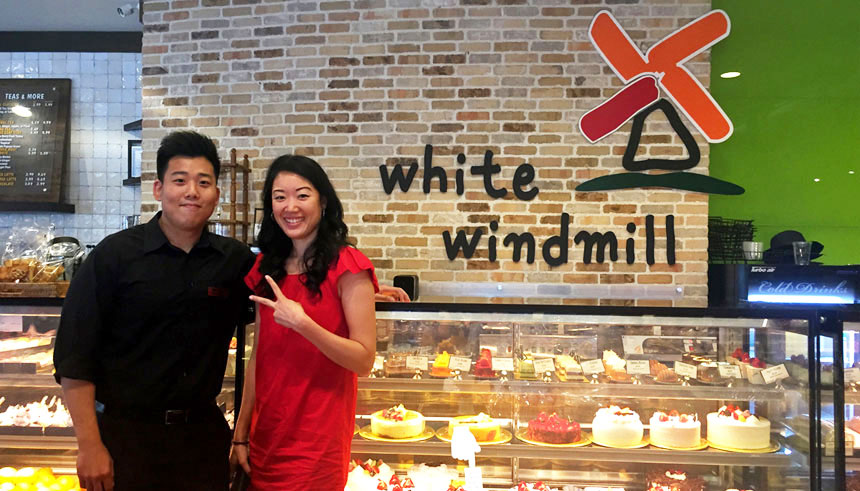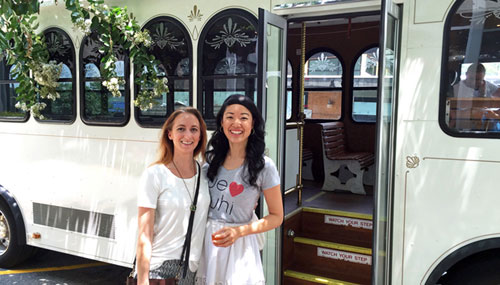East West Lifestyle
Helping Diverse Business Corridors Speak as One

How communities of diverse immigrant cultures can form strategic business alliances.
Anyone who takes a ride down Atlanta’s Buford Highway corridor is presented with an overload of sights and sounds, an array of symbols that offer proof that Atlanta is no longer the South of magnolia trees and antebellum mansions.
Restaurants like SoKongDong Tofu House serve bibimbap and other Korean staples. Strip malls like Plaza Fiesta are dotted with stores that sell Hispanic-themed religious figurines or bridal gowns, and Filipino shops selling halo halo desserts. Accountants, laundromats, real estate agents—many have signage lacking words in English.
Buford Highway is a smorgasbord of cultures and languages. Its denizens have one thing in common: geography. East West Bank, which was founded to serve immigrants who couldn’t get loans and personal accounts at conventional banks, operates a retail branch in the heart of the Buford Highway district and serves many of the businesses there. Bringing these disparate forces together to present a united front is the challenge that Marian Liou accepted for herself.
The easiest part, perhaps, was coming up with a catchy name: We Love BuHi (BUford HIghway). Everything else has been a far tougher task than Liou ever imagined.
“This has been very difficult. But it’s also been worthwhile to try,” said 37-year-old Liou, who previously was an employee-benefits attorney at two big Atlanta law firms. Her ambition was cultivated in her previous stops in California and New York, where she graduated from Columbia Law School in 2001. In 2004, when she moved to Atlanta, she worked as an attorney. Now, We Love BuHi is her full-time job (although she still does a little bit of employment law on the side).
To unify the district with a distinct identity, We Love BuHi started its public trolley tours in 2016, which included 24 businesses on the itinerary, Liou said. The tours brought new customers into these businesses.
"Most of the people said they had never been into these places, and they said they definitely would return," she said.

"Buford Highway is so much more than just the food."
Celebrating BuHi’s cultural contributions
Back in Atlanta, Liou never thought of her project as simply a chamber of commerce, although that was certainly one key part of it. Instead, her goal was nothing short of making sure Buford Highway was “celebrated” for its unique contribution to the cultural fabric of Atlanta.
“Buford Highway is so much more than just the food,” Liou said. “As a second-generation Asian-American, places like Buford Highway were very familiar to me, but I didn’t think it was being adequately covered in the local or national media.”
In spite of the obvious shared interests of merchants in the area, no one has been able to successfully organize businesses along Buford Highway before now, said Zed Yu, a relationship manager at East West Bank’s branch in Chamblee, Ga.
“It’s hard to do, but I’ve seen Marian be able to get the idea across to these businesses that it makes sense, that it will help build a better community,” said Yu, who works in the East West Bank office located in the heart of the Buford Highway corridor.
Immigrants band together
Liou isn’t alone in grappling with the issue of how communities populated by diverse immigrant cultures can form strategic alliances. It is taking place all across America, and especially in the Southeastern U.S., where these communities have taken shape only fairly recently.
These corridors include Nolensville Pike in Nashville, Tenn.; Central Avenue in Charlotte, N.C.; and Wade Hampton Boulevard in Greenville, S.C. Like Buford Highway, each contains an essential ingredient—a surplus of large commercial spaces, available for rent at cut-rate prices.
Kansas City, Mo., has a large population of Nigerian, Sudanese and Somalian immigrants and refugees. The Don Bosco Centers is an affiliation of several programs designed to reach this population, such as teaching English as a second language. One of its locations hosts a tour of international restaurants in northeast Kansas City, a program developed by a local chamber of commerce.
In Nashville, some Latino residents established Conexión Américas in year 2002, a nonprofit designed to help newcomers buy homes, improve their English and navigate local school systems. Conexion Americas has since opened Casa Azafrán, a community center that provides space to a variety of nonprofits that help the refugee community.
When the Urban Land Institute (ULI) presented an Excellence in Development Award to Casa Azafrán in 2014, the ULI said, “This should be an example across the country on ‘smart building and design’ meets ‘economic and cultural investment’ through public/private partnerships.”
Making BuHi livable, healthy and sustainable
Liou wants We Love BuHi to help make Buford Highway “livable, healthy and sustainable.” That also means pushing back against undesirable gentrification of the corridor, not to mention political polarization and income equality.
Liou’s mission echoes the goals of another Atlanta organization, the Center for Civic Innovation, where Liou has served as a fellow. The Center holds workshops and seminars to help facilitate investments in local small businesses. Its mission is to serve “as a celebration of our history and the amazing things ahead for this city’s future,” said Rohit Malhotra, the Center’s founder and executive director.
That’s obviously what Liou is up to. One of the signature features of We Love BuHi is its “trolley” tours, which provide a sampling of food offerings along Buford Highway. The community’s dining offerings have become, perhaps, its main calling card; once the domain of foodies who flocked to the strip to engorge on dim sum, now Atlantans of all stripes and persuasions know about the quality of Buford Highway’s restaurants.
“During the last few years, I've personally been most excited by the millennials' willingness to visit Buford Highway, where you can dine quite well for $10. I've been eating there for decades,” legendary Atlanta food critic Cliff Bostock wrote in a 2015 column for Georgia Voice.
Challenges of diversity
But Liou also gets frustrated by the sheer difficulty of bringing together a huge group of people, each with their own agendas and who have come to Atlanta from all across the globe. Then add this layer on top of that: Buford Highway spans multiple cities and counties.
“This probably would have been a lot easier if this corridor had been completely under one jurisdiction,” she said. “If it had all been in just one city, it would have been easier to make a value proposition to that one city. Instead, I have to repeat the same message multiple times. The different cities each have different goals, but that makes it completely fascinating.”
One of the biggest needs of ethnic communities is massive upgrade to their existing public infrastructure, especially roads and transit. Corridors like Buford Highway and Nolensville Pike became rife with strip mall and residential development in the ‘60s as the roads became conduits specifically for cars, to move people from the suburbs to their jobs in the urban core. But the corridors are no longer used in that way, Liou said.
“The housing is cheaper [in these corridors], but the transportation is more expensive for people who live there” because they can’t walk to work, she said. “Cities can’t afford to continue upkeep on roads that are 60 miles from the urban center.”
Pedestrian improvements
Thankfully for Buford Highway, it’s served by Atlanta’s public transit authority, as well as a few privately owned bus lines that serve as local shuttles. There have been some modest efforts to make Buford Highway safer and more pleasant for pedestrians, such as brightly marked crosswalks, but Buford Highway still has a long way to go before it can be called “pedestrian friendly,” Liou said.
And that’s where We Love BuHi fits in the narrative. A group like We Love BuHi can shine a spotlight on Buford Highway, touting its appeal but at the same time serving as a billboard for assistance, not only to attract help from the state highway department, but also from private investors who see opportunities in Buford Highway’s outdated buildings to make it something spectacular, she said.
If We Love BuHi can reach a level of critical mass where elected officials and other local leaders contact Liou or her members, then she will feel like the effort has been a success.
“Buford Highway is not conventionally beautiful, but there are so many wonderful things about it,” she said. “I want to identify what’s great about Buford Highway and emphasize what its assets are to the greater community.”
Sign up for the Reach Further Newsletter
We’ll keep you in the know about the latest US-Asia business news and trends.
Suscríbase al boletín Reach Further
Lo mantendremos informado sobre las últimas noticias y tendencias comerciales entre Estados Unidos y China.

